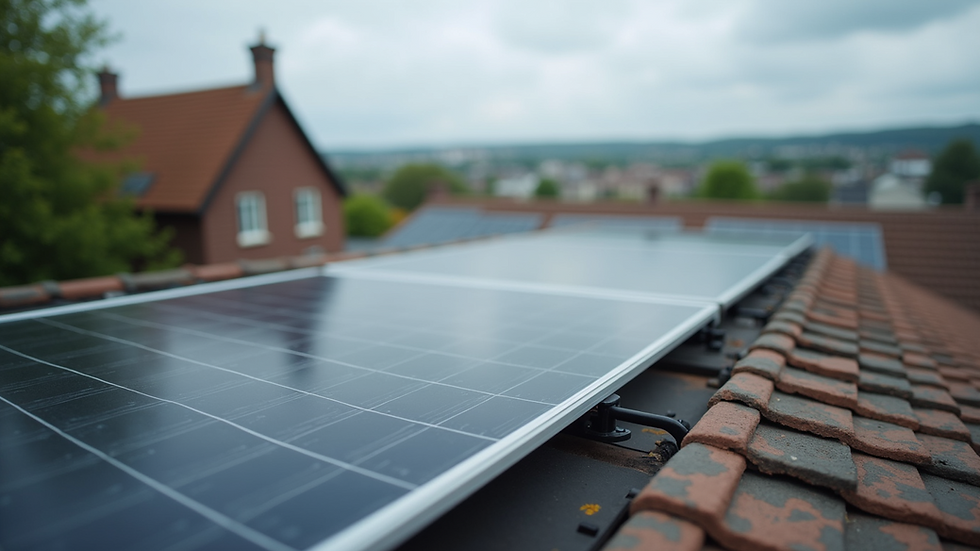Why Going Solar with Battery Storage is a Game Changer for Your Home
- Bill Adams
- Jul 20, 2025
- 4 min read
As more homeowners look for sustainable energy solutions, the combination of solar panels and battery storage stands out as a transformative option. This pairing not only captures the sun’s energy but also provides reliable backup power. You can enjoy energy efficiency and independence like never before.
With technology advancing and more people understanding environmental concerns, it is clear that the benefits of solar energy are significant. In this blog post, we will explore why going solar with battery storage is a smart choice for your home, making energy management smarter and more efficient.
Understanding Solar Energy and Battery Storage
To appreciate the advantages of solar energy and battery storage, it’s important to know how they work. Solar panels convert sunlight into electricity using photovoltaic cells. This clean energy can significantly reduce your reliance on traditional power sources.
Battery storage complements this system by allowing you to store extra energy produced during sunny days for use during the night or on cloudy days. For example, if your solar system produces 30 kWh of energy on a sunny day but you use only 20 kWh, the 10 kWh can be stored in a battery for later use. This setup means that your home benefits from solar power whenever you need it, not just when the sun is shining.
Key Benefits of Going Solar with Battery Storage
Energy Independence
One of the biggest advantages of combining solar energy with battery storage is the energy independence it offers. By generating and storing your own electricity, you rely less on traditional power companies.
This advantage is particularly valuable during power outages. For example, during a severe storm, homes with solar battery systems can continue operating essential appliances like lights and refrigerators, while others may be in the dark.
Cost Savings
Though the initial investment in solar panels and battery storage can be substantial, the long-term financial benefits are significant.
Homeowners can expect their monthly electricity bills to drop by 50% or more after switching to solar. Furthermore, if you utilize battery storage to use your stored energy during peak pricing hours, you could save even more. For instance, if your utility charges 30 cents per kWh during peak hours, using stored energy could reduce what you pay for electricity throughout the month.
Environmental Benefits
Choosing solar energy drastically lowers your carbon footprint. As climate change becomes a more pressing issue, opting for renewable energy sources is a critical step forward.
Solar energy is clean and sustainable, with studies showing that it can avoid over 4,000 pounds of carbon dioxide emissions per year for the average home. By adding battery storage, you maximize your use of renewable energy, contributing to a cleaner environment for future generations.
Increased Home Value
Investing in solar energy and battery storage can also enhance your home’s resale value. Radically energy-efficient homes are in high demand.
According to a recent study, homes with solar energy systems can sell for 4% more than comparable homes without solar. This added value not only makes your property more attractive to potential buyers but also represents a smart investment for your future.

Energy Resilience
In today’s world, where extreme weather events are becoming more common, resilience in energy supply is increasingly critical. Battery storage systems allow your home to maintain power during outages, supporting essential appliances and offering you peace of mind.
The combination of solar panels and battery storage equips your home to handle emergencies better. Knowing that you can rely on your system during unforeseen events allows for a greater sense of security.
Choosing the Right Solar Battery System
When considering solar battery storage, you need to keep several factors in mind for the best fit for your home.
Capacity and Power Rating
First, evaluate the battery’s capacity and power rating. Capacity is the total amount of energy the battery can store, typically measured in kilowatt-hours (kWh). For instance, a battery with a capacity of 12 kWh can hold enough power to run essential appliances for several hours during an outage.
Power rating, on the other hand, refers to how much electricity can be delivered at once. This is vital for running multiple appliances simultaneously during peak consumption periods, so pay close attention to these specifications.
Battery Type
You will find various battery types on the market, each with pros and cons. Lithium-ion batteries are favored for their efficiency and longevity, often lasting 10-15 years or more.
Conversely, lead-acid batteries are less expensive upfront but have shorter lifespans and lower efficiency. Understanding the attributes of different battery types can guide you to the right choice for your energy needs.
Embracing Solar for a Sustainable Future
Going solar with battery storage represents more than just an energy solution; it signifies a commitment to sustainability, efficiency, and independence. This combination allows homeowners to take advantage of renewable energy, lower electricity bills, and protect themselves from power outages.
Navigating today’s unpredictable energy landscape can be challenging, but investing in solar energy and battery storage not only secures your home but also benefits the planet. With continuous advancements in technology, now is the perfect time to embrace this transformative energy approach.
By adopting solar power and battery storage, you’ll enjoy the rewards of harnessing renewable energy while doing your part to protect the environment. Make the change today and step into a brighter, more sustainable future!




Comments